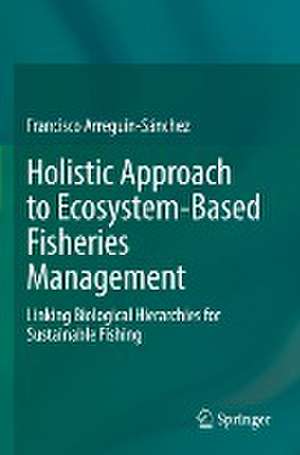Holistic Approach to Ecosystem-Based Fisheries Management: Linking Biological Hierarchies for Sustainable Fishing
Autor Francisco Arreguín-Sánchezen Limba Engleză Paperback – apr 2023
| Toate formatele și edițiile | Preț | Express |
|---|---|---|
| Paperback (1) | 884.88 lei 6-8 săpt. | |
| Springer International Publishing – apr 2023 | 884.88 lei 6-8 săpt. | |
| Hardback (1) | 890.68 lei 6-8 săpt. | |
| Springer International Publishing – 31 mar 2022 | 890.68 lei 6-8 săpt. |
Preț: 884.88 lei
Preț vechi: 1079.12 lei
-18% Nou
Puncte Express: 1327
Preț estimativ în valută:
169.34€ • 174.94$ • 140.94£
169.34€ • 174.94$ • 140.94£
Carte tipărită la comandă
Livrare economică 26 martie-09 aprilie
Preluare comenzi: 021 569.72.76
Specificații
ISBN-13: 9783030968496
ISBN-10: 3030968499
Pagini: 160
Ilustrații: XXI, 160 p. 65 illus., 3 illus. in color.
Dimensiuni: 155 x 235 mm
Greutate: 0.27 kg
Ediția:1st ed. 2022
Editura: Springer International Publishing
Colecția Springer
Locul publicării:Cham, Switzerland
ISBN-10: 3030968499
Pagini: 160
Ilustrații: XXI, 160 p. 65 illus., 3 illus. in color.
Dimensiuni: 155 x 235 mm
Greutate: 0.27 kg
Ediția:1st ed. 2022
Editura: Springer International Publishing
Colecția Springer
Locul publicării:Cham, Switzerland
Cuprins
Chapter 1 - Introduction.- Chapter 2 - Conventional fisheries management and the need of the ecosystem approach.- Chapter 3 - Ecosystem trophic structure and dynamics: basic concepts
Chapter 4 - Fisheries within the ecosystem context: the production, surplus production and balanced harvest.- Chapter 5 -Holistic indicators: theoretical basis.- Chapter 6 - Resilience.- Chapter 7 - Reference Points: Stock-based BRP vs. ecosystem(holistic)-based BRP.- Chapter 8 - Managing fisheries under an holistic approach.- Chapter 9 - Adaptability as management policy.- Chapter 10 - Selected study cases.- Chapter 11- Holistic approach and management practice.
Notă biografică
Francisco Arreguín-Sánchez is a Professor at the Instituto Politécnico Nacional, Centro Interdisciplinario de Ciencias Marinas. Research lines: Dynamics of exploited ecosystems and populations; climate change, and fisheries management. Currently his chief scientific research is in ecosystems dynamics, with a focus on holistic properties like resilience and self-organization, and their response to disturbances caused by climate change and fishing.
Member of the Mexican Academy of Sciences, National Researcher Level 3 of the National System of Researchers. Advisory Professor of East China Normal University. Director at the Centro Interdisciplinario de Ciencias Marinas, IPN, (2001-2004). In 2010 Prof. Arreguín-Sánchez received the Lázaro Cárdenas Prize, which was presented by the President of Mexico; he has also received the Prize of Science and Technology, and the Medal of Scientific and Technological Merit, both awarded by the Congress of Baja California Sur State.FAOconsultant on fisheries research policy, development plans, fisheries management, impact of fishing on ecosystems, and training professionals in fisheries research, in several Latin American countries. In addition to being a Counselor and Member of several scientific committees for scientific research institutions in Mexico, Prof. Arreguín-Sánchez has participated in various international and national evaluation committees for research projects (i.e. the European Union 6th Framework Program, CONICET Argentina, COLCIENCIAS Colombia, CONICYT Chile, and CONACyT Mexico). He is also a former member of the Advisory Board of the Instituto Nacional de Pesca (2003-2007) and current member of the Governing Bodies of several scientific research institutions. He has also contributed to the training of human resources, having adviser of 26 doctoral theses, 34 master's, and has taught more than 130 courses at the graduate level.
Member of the Mexican Academy of Sciences, National Researcher Level 3 of the National System of Researchers. Advisory Professor of East China Normal University. Director at the Centro Interdisciplinario de Ciencias Marinas, IPN, (2001-2004). In 2010 Prof. Arreguín-Sánchez received the Lázaro Cárdenas Prize, which was presented by the President of Mexico; he has also received the Prize of Science and Technology, and the Medal of Scientific and Technological Merit, both awarded by the Congress of Baja California Sur State.FAOconsultant on fisheries research policy, development plans, fisheries management, impact of fishing on ecosystems, and training professionals in fisheries research, in several Latin American countries. In addition to being a Counselor and Member of several scientific committees for scientific research institutions in Mexico, Prof. Arreguín-Sánchez has participated in various international and national evaluation committees for research projects (i.e. the European Union 6th Framework Program, CONICET Argentina, COLCIENCIAS Colombia, CONICYT Chile, and CONACyT Mexico). He is also a former member of the Advisory Board of the Instituto Nacional de Pesca (2003-2007) and current member of the Governing Bodies of several scientific research institutions. He has also contributed to the training of human resources, having adviser of 26 doctoral theses, 34 master's, and has taught more than 130 courses at the graduate level.
Textul de pe ultima copertă
This book provides cutting-edge scientific idea and novel concepts on the ecosystem-based approach to fisheries management. It begins by reviewing the scientific fundamentals and problems currently faced by conventional fisheries science, based on population dynamics. In turn, it reviews the theoretical basis of ecosystem dynamics, including selected ecosystem indicators. Surplus production and balanced harvests are discussed in the ecosystem dynamics context. Several ecosystem-holistic indicators are described, but particular emphasis is placed on two: the noxicline (gain in entropy due to loss of biomass) and resilience, which are expressed as ecosystem (holistic) points of reference for defining allowable harvest rates. Both biological (population) and ecosystem (holistic) points of reference are subsequently analyzed in the context of fisheries management and conservation. An adaptability concept is also discussed as a management policy for facing climate change. In closing, the concepts presented are applied to six study cases involving a range of different ecosystems and fisheries.
Caracteristici
It reviews the current problems faced by conventional fisheries science Biological and ecosystem perspectives are analyzed in the context of fisheries management Includes six case studies, in which the book’s concepts are applied to various types of ecosystem
